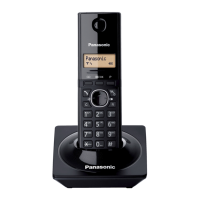35
KX-TG1711MEB/KX-TG1712MEB/KX-TGA171MEB
11.1.2.2. Batch file Setting
Note:
• “*****” varies depending on the country.
11.1.2.3. Commands
See the table below for frequently used commands.
Command name Function Example
readid Read ID (RFPI) Type “readid”, and the registered ID is read out.
writeid Write ID (RFPI) Type “writeid 00 18 E0 0E 98”, and the ID “0018 E0 0E 98” is written.
setfreq adjust Frequency of RFIC Type “setfreq nn nn”.
hookoff off-hook mode on Base Type “hookoff”.
hookon on-hook mode on Base Type “hookon”.
Getchk Read checksum Type “getchk”.
1.
Insert the Batch file CD-ROM into CD-ROM drive and
copy PNZZTG***** folder to your PC (example: D drive).
2.
Open a window of MS-DOS mode.
3.
At the DOS prompt, type "D:" (for example) to select the
drive, then press the Enter key.
4.
Type "CD 㪳PNZZTG*****", then press the Enter key.
5.
Type "CTE open com X", then press the Enter key
(X: COM port number used for the serial connection on your PC).
6.
Type "READID", then press the Enter key.
䊶If any error messages appear, change the port number or
䇭check the cable connection.
䊶If any value appear, go to next step.
7.
Type "DOSKEY", then press the Enter key.
<Example: correct setting>
C: >Documents and Settings>D:
D: >>CD >PNZZTG*****
D: >PNZZTG***** >CTE open com X
D: >PNZZTG*****>READID
00 52 4F A8 A8
D: >PNZZTG*****>DOSKEY
D: >PNZZTG*****>
<Example: incorrect setting>
C: >Documents and Settings>D:
D: >>CD >PNZZTG*****
D: >PNZZTG***** >CTE open com X
D: >PNZZTG*****>READID
ReadID
ReadIPUI Error: read access failed
D: >PNZZTG*****>
<Example for Windows>
On your computer, click [Start], select Programs
(All Programs for Windows XP/Windows Server 2003),
then click
MS-DOS Prompt. (for Windows 95/Windows 98)
Or
Accessories-MS-DOS Prompt. (for Windows Me)
Or
Command Prompt. (for Windows NT 4.0)
Or
Accessories-Command Prompt.
(for Windows 2000/Windows XP/Windows Server 2003)

